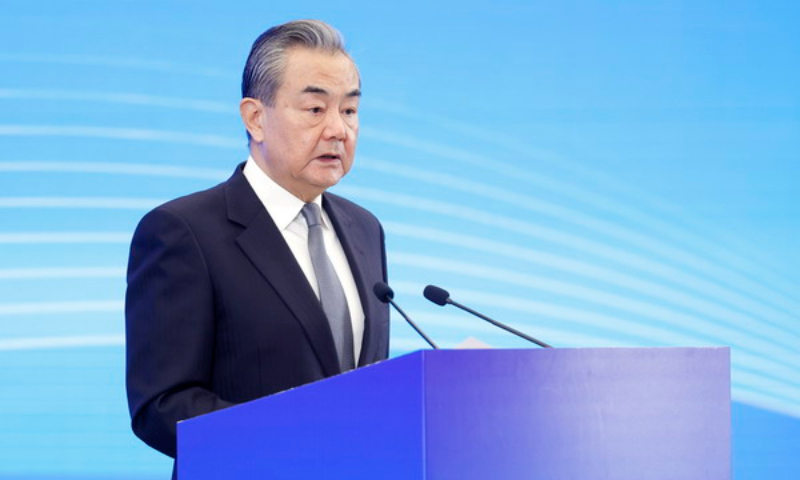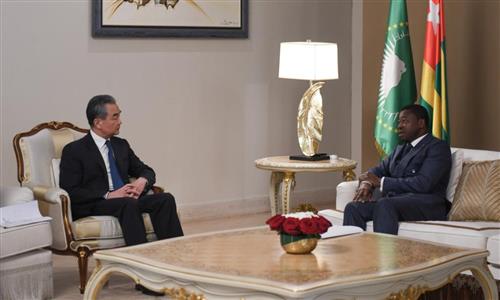Wang Yi starts trip to LatAm after ‘new year visits’ in Africa
Trips show Global South occupies prominent position in China's diplomacy: experts

Chinese Foreign Minister Wang Yi Photo: mfa.gov.cn
Chinese Foreign Minister Wang Yi kicks off his trips to Brazil and Jamaica on Thursday following his first overseas tour in 2024 to four African countries which started from January 13, a tradition that began in 1991.
Analysts believe that the Chinese top diplomat's trip to Latin America is expected to focus on further strengthening mutual political trust and practical cooperation with partners in various fields, especially in the current context of rising geopolitical risks, and make plans and arrangements for high-level meetings that may be held this year.
Regarding Wang Yi's visits in both Africa and Latin America, analysts believe it showed that China, as part of the group of developing countries, has always attached importance to cooperation with the Global South nations, which are a healthier, more stable, and more sustainable positive force in the international order.
Enhancing mutual trust
The year 2024 marks the 50th anniversary of the establishment of diplomatic ties between China and Brazil and the fifth anniversary of the China-Jamaica strategic partnership. Before Wang's departure, Chinese Foreign Ministry spokesperson Mao Ning said Brazil and Jamaica are China's important cooperation partners in Latin America and the Caribbean.
"We enjoy a deep traditional friendship and engage in fruitful cooperation in trade, people-to-people exchanges and other fields. We share identical or similar positions on many regional and international issues," Mao said.
According to Mao, China will take this opportunity [of Wang's visits] to further cement the foundation of political mutual trust, deepen mutually beneficial and friendly cooperation across the board and enhance communication and coordination on major international and regional issues for sustained and substantive growth of China's relations with Brazil, Jamaica, and Latin America and the Caribbean as a whole.
Zhou Zhiwei, an expert on Latin American studies at the Chinese Academy of Social Sciences, told the Global Times on Thursday that cooperation between China and Latin American countries has maintained a good pace, and China, Brazil and Jamaica are all willing to enhance cooperation for post-pandemic recovery.
During a state visit to China in April 2023 by Brazilian President Luiz Inacio Lula da Silva, the two sides signed several bilateral cooperation documents covering trade and investment, the digital economy, and information and telecommunication.
The momentum is expected to be continued during Wang's visit, and we can even expect the possibility of signing on new cooperation, said Zhou.
During Lula's latest visit to China, he paid a visit to the Huawei site in China's financial hub Shanghai, and also called on developing countries to reduce their dependence on the US dollar by using their own currencies and China's RMB in international trade.
China and Brazil may also coordinate their positions on the diversification of foreign-exchange reserves, and this includes reducing the hegemony of the US dollar, Zhou said.
The two sides are very likely to discuss the settlement of trade in local currencies and RMB, the scale and scope of application of which are also likely to further expand in 2024, Zhou noted.
In addition, the two sides may further explore cooperation in cutting-edge technology, according to Zhou. "The independent development of technology is of vital importance to developing countries."
Brazil is an important member of BRICS, and is also taking over the G20 presidency in 2024. In November this year, the G20 Summit is scheduled to be held in Rio de Janeiro. Analysts believe that cooperation and coordination between China and Brazil go beyond the bilateral scope and have taken on an international dimension.
Whether it is regarding the agenda of the G20 Summit or BRICS cooperation, China and Brazil will have a direct communication of positions, Zhou said. Around the important time node of the 50th anniversary of diplomatic ties, the two sides may discuss plans and arrangements for high-level meetings that may be held this year.
In general, Wang Yi's visit will further strengthen political mutual trust between China and Latin America, especially at a time when global geopolitical and economic risks are rising. As two large developing countries, the interaction between China and Brazil is crucial to maintaining the shared position and common interests of the countries of the Global South, Zhou stated.
'South-South cooperation'
Global South friendship and cooperation was also highlighted during Wang's trip to the African nations of Egypt, Tunisia, Togo and Cote d'Ivoire from January 13 to 18.
During his meeting with Togolese President Faure Gnassingbe on Wednesday, Wang hailed the China-Togo friendship, which was forged by the older generation of leaders and has become a model of South-South cooperation.
Wang said China will enhance the synergy of development strategies with Togo and support the country in achieving sustainable development. He stressed that China will always stand firmly with Africa, support it in accelerating its independent development, and promote the upgrading of China-Africa cooperation to deliver more fruits of China-Africa cooperation to Togo and other African countries.
China has deep friendship and common interests with Africa and Latin America, Li Haidong, a professor at the China Foreign Affairs University, told the Global Times on Thursday.
According to Li, making Africa and Latin America the first two destinations of the top diplomat's overseas visits in 2024 shows that countries of the Global South, which China is also part of, occupy a prominent position in China's diplomacy.
The countries of the Global South are a dynamic and active force in the international community, and have a strong desire for a more equitable, balanced and sustainable world order, Li said.
As Wang concluded his trip in Africa, some Western media such as VOA hyped the "debt trap" narrative and claimed that "not all African countries are as keen on China as they once were."
In response, Li criticized the VOA report as having a strong sense of ideological confrontation by coordinating with the tone of the US government as a tool of propaganda warfare against China.
The international community is well aware of the lies and hype of the US media, which is unlikely to have a large audience, Li noted.
Song Wei, a professor from the School of International Relations at Beijing Foreign Studies University, told the Global Times on Thursday that Wang's visits reflected China's attention to African affairs and its support for Africa to independently resolve its own affairs.
China will host the 9th meeting of the Forum on China-Africa Cooperation (FOCAC) in 2024, and it will be the first time Chinese and African leaders will be gathering in China after the FOCAC Beijing Summit in 2018.
It is an event that both China and Africa are looking forward to. One of the important aspects of Wang's Africa visits is coordinating with the African nations on FOCAC and consolidating the momentum of China-Africa solidarity and cooperation, Song said.
Both FOCAC and the Chinese foreign minister's new year visits have all been normalized, in addition to several institutionalized exchanges between the two sides, Song noted.
The relationship between China and African countries is based on a high degree of mutual trust and convergence of interests, said Li, noting that Wang's visits have made the relationship more robust.


